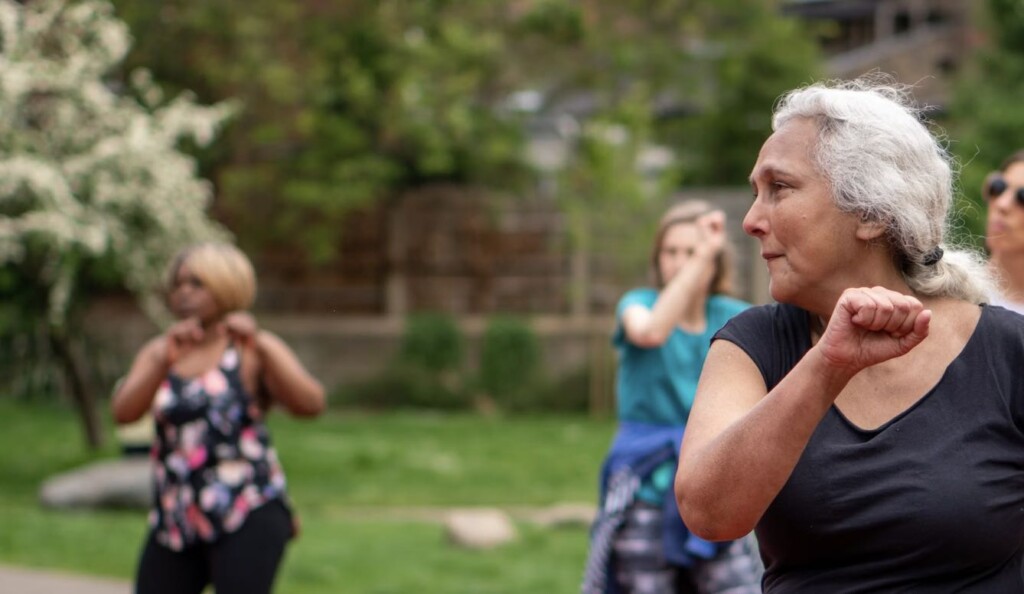 Photo by Centre for Ageing Better (public domain)
Photo by Centre for Ageing Better (public domain)Your attitudes about aging, whether positive or negative, can lead to a better—or worse—cognitive experience in your senior years, suggests a new study from researchers at Penn State.
Getting older comes with certain expectations, from gray hair to wrinkles to forgetfulness. While these beliefs may seem harmless, they may influence how one perceives their own cognitive abilities while they age.
The team found that people who had more positive expectations of aging tended to report less frequent cognitive problems, such as difficulty concentrating or keeping track of what they were doing. They were also less likely to report that their cognitive performance had declined over time.
If we can modify the expectations that older adults have about aging, “we could support healthier cognitive aging” by increasing awareness and teaching accurate assumptions about the process.
“Aging expectations are malleable and influence an individual’s perceptions of their cognitive functioning,” said Nikki Hill, associate professor in the Ross and Carol Nese College of Nursing at Penn State, who is first author on the paper published in the journal Aging & Mental Health.
Previous research has found that expectations about aging, such as whether a person expects to maintain high levels of activity or if they expect everything to go downhill, are associated with health. Those with more negative aging expectations tend to experience worse outcomes, such as more rapid physical and cognitive decline, while positive perceptions of aging are linked to behaviors that promote health and wellbeing like exercise.
 Fotolia
FotoliaHill is interested in understanding how older adults experience cognitive changes and how that influences outcomes related to aging. In her work, she said she’s noticed that when people describe their experiences, they often include stereotypical and stigmatized beliefs about aging and cognitive decline.
It led Hill to wonder how people’s expectations about the aging process may influence how they interpret cognitive changes they may experience—a relationship that few studies have examined.
“Do people’s perceptions of what they expect aging to be in the future, in terms of physical health, mental health, cognitive health, affect the way that they perceive their cognitive performance?” Hill said. “If it does, then that gives us more clues about how to interpret people’s reports of cognitive changes and, potentially, how to intervene earlier to support people to maximize their aging outcomes.”
CHECK OUT: Eight Habits to Take Up by Age 40 if You Want to Live Decades Longer
For example, people who are worried about perceived declines in their cognitive function—even if their cognitive health is normal—are at higher risk for developing a cognitive impairment in the future, Hill explained. She said that with conditions like Alzheimer’s disease and related dementias, there’s a slow, gradual decline in cognitive function over decades and people often experience subtle symptoms before clinical tests identify an impairment in cognition.
The research team conducted an online survey among individuals aged 65 and older in the United States who lived independently and didn’t report any diagnosis of dementia or other cognitive impairment. A total of 581 people completed the survey; 51% of the respondents were women and 74% were non-Hispanic white.
The survey asked about their expectations about physical health, mental health and cognitive function in relation to aging. They were asked to rate statements — for example, “every year that people age, their energy levels go down a little more” — on a four-point scale from “definitely true” to “definitely false.”
GREAT ADVICE: 8 Weeks of Lifestyle Changes Reduced Biological Age by 3 Years In Groundbreaking Proof-of-Concept Study
To assess their perceptions of their own cognition, participants were asked about their cognitive abilities over the last seven days. They were also asked about their ability to perform certain tasks today compared to 10 years ago to assess whether they believed their cognitive abilities had declined.
The team found that people who had more positive expectations of aging tended to report less perceived decline in their cognitive abilities, both in the last week, and over the last 10 years. On the other hand, more negative expectations of aging were linked to more negative perceptions of their current cognitive performance and whether they perceived cognitive decline.
Attitudes about both physical and mental, and cognitive health affected how they perceived their cognition. People with positive aging expectations in any of the three domains were more likely to rate their cognition higher, while people with negative expectations rated their cognition lower.
POPULAR: Another Study Shows Daily Multivitamin for People Over 60 Slows Memory Decline That Comes With Aging
“If we can intervene in a way to ground aging expectations more in what is true and less stigmatized, then maybe we can help people clarify what they’re experiencing in terms of cognitive changes, which will support our ability to respond to individual needs for maximizing cognitive health,” Hill said.
The team plans to conduct more research, including how healthcare providers engage patients in conversations about cognitive health and aging.
ENCOURAGE BRAIN HEALTH By Sharing This on Social Media…
Source link

